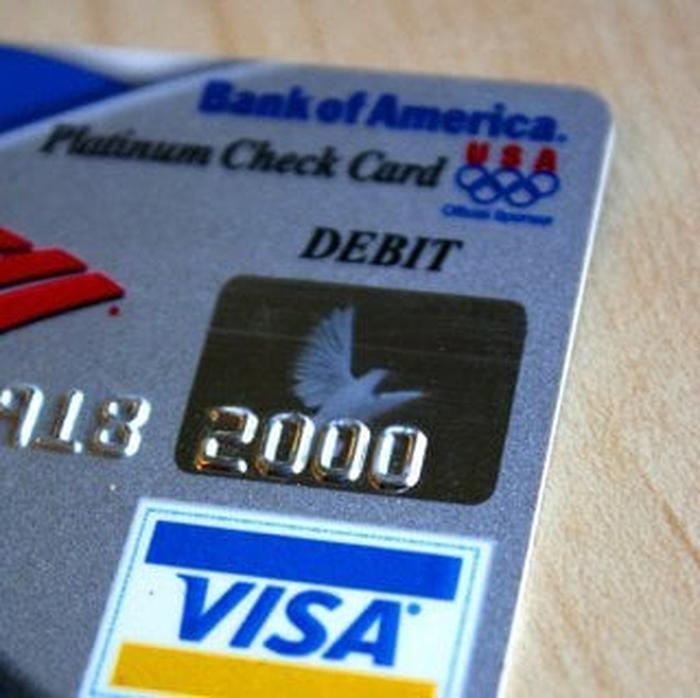
I’ve never been a fan of debit cards. You might wonder why, when they seem so useful—quick access to your money, immediate purchase power, and no need to carry around a wad of cash. Plus, they’re better than credit cards, right?
Not so fast. There are actually some big downsides to swiping that bank card. And now that Bank of America has announced it will charge debit cardholders a monthly $5 fee (that’s $60 a year simply for quick access to your own money!), and Chase and Wells Fargo are scheduled to follow, we should all reexamine how we use the plastic in our wallets.
Here are five reasons to be wary of debit cards, plus some tips for being smart when you use them.
You (Subconsciously) Spend More
Do you keep track of your purchases? So does Sharon, one of my clients. She follows the rules for financial success—logs her spending, doesn’t carry a credit card balance, owns her home—but during her recent financial check-up, she was frustrated that she hadn’t saved as much as we had planned. The culprit? Her debit card. While she thought she was being “good” by not using her credit card, all her little debit purchases were adding up. Studies show that this is a common pitfall: If we have actual cash in hand, we’re apt to think twice before forking it over. But when we’re paying with plastic, we’re much more careless about our spending.
Overdraft Expenses Add Up
Unless you track your expenses faithfully, debit cards make it easy to spend more money than you actually have in your account—and that’s an expensive oversight. On top of a steep fee ($35 per transaction, on average), you can be charged a 20% annual interest rate on that overdrawn balance. That single $50 purchase that put you over the limit can nearly double to $96 within a year between fees and interest.
And careful though we try to be, a lot of us are guilty—financial institutions will charge consumers an estimated $38.5 billion in overdraft penalties in 2011 according to a Pew Health Group study. That’s huge!
Your Credit Can Take a Hit
Not only is a debit card unhelpful in building your credit, it can actually bring your credit score down—if you overdraft and carry a negative balance at your bank, it will show up as another debt on your credit report.
Don’t think it’s a big deal? Even if you aren’t in the market to buy a home, if you’re looking for a new job or trying to rent an apartment, know that potential employers and prospective landlords will often examine your credit report to determine how financially worthy (read: responsible) you are.
They Complicate Purchases and Returns
Sure, you can technically buy anything with a debit card, but doesn’t mean you should—and you particularly shouldn’t make large purchases. When you use your debit card, you have less legal protection if you need to dispute the buy with the merchant than you do with a credit card. And if you’re trying to get your money back, it can take longer to return it to the account.
And don’t even think about using debit to book a car rental or a hotel room. Those service providers can require a hefty deposit, and whether that amount actually posts to your account or simply shows up prematurely as a hold, your bank will see it as reserved funds (and of course, charge you if you overspend). You don’t want your cash tied up on your vacation!
When You Lose it, You Lose
Many of us have been there—left our wallet in a taxi, or worse, had it stolen from our bag. If you lose a credit card, you can promptly call the company to cancel it and dispute any illegitimate charges. But if your debit card goes missing, even if you contact your bank immediately to cancel it, your bank can legally wait up to two weeks to return funds to your account. Yes, that could mean you’re stuck paying an important bill or your rent late. What’s worse, if you wait too long to report the lost debit card, the bank may not be able to help you recover any illicit spending.
Smart Rules for Debit Use
Despite their pitfalls, debit cards are an integral part of banking, buying, and budgeting for many, and they can be hard to give up. If you want to keep your card, just be conscious of how you use it, and be sure that your money and credit are protected. Here are some guidelines for smart debit spending:
But my recommendation? Use cash whenever possible, and when you are going to use plastic, trade your debit card for a credit card that gives you points, cash back, or other rewards for your spending. You want your way of paying to work for you, not hold you back.